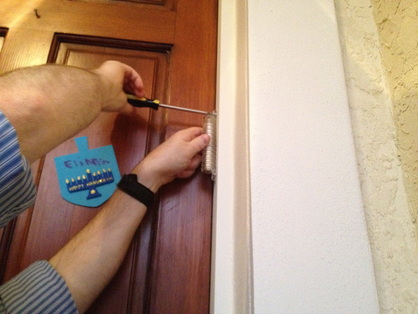Hear, O Israel, Adonai is our God, Adonai is one! You shall love Adonai your God with all your mind, with all your body and with all your being. You shall bear in mind these words which I command you today. You shall teach them to your children and speak them when sitting in your house and when walking outdoors, when you go to bed and when you get up. You shall write them upon the doorposts of your house and on your gates. (Deuteronomy 6:4-9)
People ascribe many different meanings to the mezuzah. Sometimes it is seen as a kind of talisman, like a rabbit's foot to bring good luck. Some people think of the mezuzah as a religious identifier for the house, like a sign that says, "The residents of this home are Jewish." There is some reason to think of the mezuzah as a symbol of God's protection. The word Shadai (often translated as "Almighty") on the exterior of the mezuzah is taken as an acronym for the Hebrew phrase that means, "Guardian of the doors of Israel."
But the clear meaning of the mezuzah comes from the context of the Shema. The words written on the mezuzah are meant to be a constant presence in our consciousness throughout the day. Saying that you should "write them on the doorposts of your house" is a metaphorical way of saying that you should be thinking about them in every place, in the privacy of your home and when you cross the threshold into the public realm. The mezuzah is a memory device to keep us thinking about God all the time and in all places.
What a great way to inaugurate a new home! We dedicate the place where we live to the idea that whenever we enter or leave it, we should be thinking about the sanctity of our families, the divine purpose for which we were made, and the joy of living a life aware of the miracles that surround us.
Other posts on this theme:
Metzora: The Sanctity of Our Homes


 RSS Feed
RSS Feed
